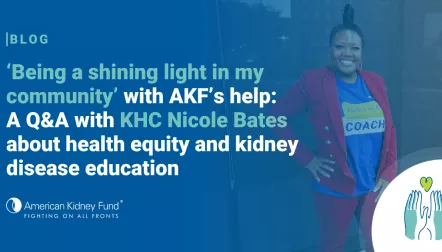
Blog post
DASH into heart health with new Kidney Kitchen® resources from the National Heart, Lung, and Blood Institute

High blood pressure is the second leading cause of kidney disease, and heart disease can not only cause kidney disease, but kidney disease can also cause heart disease. In fact, the top cause of death in people with kidney disease is heart disease. We spoke with our friends from the National Heart, Lung, and Blood Institute (NHLBI) and its The Heart Truth® program, AKF's newest Kidney Kitchen® partner, and the National Institute of Diabetes and Digestive and Kidney Diseases (NIDDK) about how people with kidney disease can manage their heart health through food.
The Heart Truth is NHLBI's national education program that focuses on preventing heart disease in women and other vulnerable populations. Through our partnership on Kidney Kitchen, they are sharing lots of great DASH (Dietary Approaches to Stop Hypertension) eating plan resources that can help people with kidney disease manage, or even lower, their blood pressure. According to The Heart Truth program team, the DASH eating plan is a heart-healthy approach that has been scientifically proven to lower high blood pressure. So far on Kidney Kitchen, you can find The Heart Truth's Making the Move to DASH, Getting Started with DASH, Tips to Keep on Track with the DASH eating plan and Tips to Reduce Salt and Sodium resources, plus three cooking demonstrations in our video library. Additional DASH resources and recipes will be added over the next few months.
Alison Brown, MS, PhD, program director in NHLBI's Division of Cardiovascular Sciences, says it is important for people with kidney disease to manage their blood pressure and heart health because heart disease is the number one cause of death in the U.S., and having kidney disease can increase your risk. While Heart Month (February) is a great time to raise awareness, she wants you to care about your heart health all year long.
Eating plans like DASH are great for lowering blood pressure, especially if you have salt sensitivity, Dr. Brown says. When you have salt sensitivity, your body reacts to the extra sodium (salt) added to foods by increasing your blood pressure. Eating foods that are higher in sodium can impact your heart and kidney health, especially if you are salt sensitive, by causing your blood pressure to raise and contributing to the narrowing of your blood vessels throughout the body, including in your kidneys, leading to kidney disease. Women (especially if they are post-menopausal), Black people, Asian American people, and people with kidney disease are thought to be more salt sensitive than other groups.
According to Dr. Brown, the DASH eating plan can help lower your blood pressure and protect your heart because of the foods at the center of the plan — vegetables, fruits, whole grains, fish, poultry, vegetable oils and low- or non-fat dairy. Many of these foods are high in nutrients, like potassium, phosphorus and magnesium, which help regulate your blood pressure. (Learn more from Dr. Brown here.)
Ivonne Schulman, M.D., program director of translational and clinical studies of acute kidney injury at NIDDK, agrees that every single person with kidney disease, regardless of the stage, should be proactive about heart health. She says that high blood pressure and diabetes, the top cause of kidney disease, can be equally damaging to both your kidneys and your heart.
Dr. Schulman also says that the DASH eating plan is good for heart health, which means it is good for kidney health as well. Since some of the DASH foods are high in potassium and phosphorus, two nutrients people with kidney disease need to manage, she stresses that if you are in the later stages of kidney disease or on dialysis, you should work with your doctor and dietitian to make adjustments to the plan. If you do not already have kidney disease, or are in the earlier stages of the disease, she says the DASH eating plan could be beneficial for kidney disease prevention and slowing down the progression of the disease to kidney failure through blood pressure reduction. Other ways of eating that may be good for your kidneys and heart are the Mediterranean, vegetarian and vegan plans.
For more information on heart healthy living, visit the new resources on Kidney Kitchen or NHLBI's The Heart Truth.





